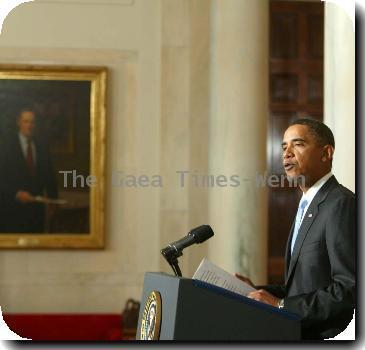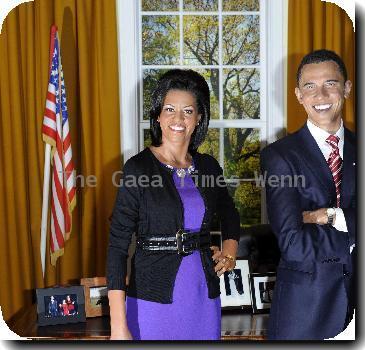China says it strongly opposes any meeting of President Obama with Dalai Lama
By APMonday, February 1, 2010
China says opposes Obama meeting with Dalai Lama
BEIJING — Any meeting between President Barack Obama and the Dalai Lama would harm bilateral relations, China warned Tuesday while repeating Beijing’s refusal to discuss Tibet’s status with the spiritual leader’s envoys.
An Obama meeting with the Tibetan spiritual leader would “seriously undermine the political foundation of Sino-U.S. relations,” said Zhu Weiqun, the executive deputy head of the Communist Party’s United Front Work Department who was in charge recent talks with the Dalai Lama’s representatives.
Zhu spoke at a news conference where he said Chinese officials told the Dalai Lama’s envoys in their weekend talks that Beijing would not make any compromises on its sovereignty over the Himalayan region and that both sides’ views remained “sharply divided.”
China maintains that Tibet has been part of its territory for centuries, but many Tibetans say the region was functionally independent for much of its history and consider the Dalai Lama their rightful leader.
The Dalai Lama’s representatives said China’s warnings came across as high-handed, but they said they would keep pursuing dialogue with Beijing despite their differences.
“The reaction of the Chinese reflects a certain unfortunate arrogance. It’s unbecoming of a nation with such a long history,” Lodi Gyari, one of the Dalai Lama’s emissaries, told reporters in Dharmsala. “We hope China behaves in a more mature way as they have to play an important role in the international arena.”
The talks showed no signs of producing any breakthroughs as both sides stuck to the positions they had assumed when they last met in November 2008 and the discussions had ended in deadlock. Beijing has refused to discuss the status of Tibet with the emissaries, saying the Chinese would only address the Dalai Lama’s return to China.
The Dalai Lama, who fled Tibet in 1959 after a failed uprising against China, leads a government-in-exile in India. Beijing has accused him of trying to split the country — a charge he denies — and often lodges protests against his travel abroad and meetings with heads of state.
The warning to Obama comes after signals from U.S. officials in recent weeks that Obama might soon meet the exiled Tibetan leader — something Chinese officials are keen to avoid before President Hu Jintao travels to Washington, possibly in April.
No date for Obama’s meeting with the Dalai Lama has been announced, but White House spokesman Mike Hammer said last month that “the President has made clear to the Chinese government that we intend to meet with the Dalai Lama, it has been his every intention.” The White House did not immediately return a call seeking comment Monday night.
Zhu did not give any details on what China would do if Obama meets the Dalai Lama, saying only: “We will take corresponding measures to make the relevant countries realize their mistakes.”
At the last round of talks in 2008, China rejected a proposal presented by the Dalai Lama’s envoys to help Tibetans achieve more autonomy under the Chinese constitution — a key demand of the minority community.
Zhu said the Chinese government was the only legitimate representative of the Tibetan people, not the Dalai Lama or his envoys. The Tibetan government-in-exile disagreed, saying the exiled spiritual leader is viewed by Tibetans as their true representative.
The Dalai Lama “speaks on behalf of the Tibetan people, with whom he has a deep and historical relationship and one based on full trust,” Gyari said in an earlier statement. “It is indeed only by means of dialogue with His Holiness the Dalai Lama that the Tibetan issue can be resolved. The recognition of this reality is important.”
China’s hard-line position and continued refusal to engage the Dalai Lama’s envoys on the issue of Tibet has been an issue of concern to many governments and will likely be viewed as an insufficient response to the issue, a Tibet expert said.
“There’s a general view that the Tibetans are a distinct nationality and indigenous one and that the Chinese government should have some obligation to work with their leaders to sort out how they are to be treated. Yet the Chinese government has consistently refused to do so,” said Michael Davis, a law professor at Chinese University of Hong Kong who writes about Tibet. “They are talking past each other, and the big question is whether anyone out there will be satisfied.”
Beijing demonizes the Dalai Lama and says he seeks to destroy China’s sovereignty by pushing independence for Tibet. The Dalai Lama has maintained for decades he wants some form of autonomy, not independence, that would allow Tibetans to freely practice their culture, language and religion under China’s rule.
Tibetan areas have been tense in recent years, with the minority community complaining about restrictions on Buddhism, government propaganda campaigns against their revered Dalai Lama, and an influx of Chinese migrants that leave Tibetans feeling marginalized. Those feelings boiled over in deadly anti-Chinese riots in 2008 that shocked Beijing’s leaders.
Associated Press writer Ashwini Bhatia contributed to this report from Dharmsala, India.
Tags: Asia, Barack Obama, Beijing, China, District Of Columbia, East Asia, Geography, Greater China, Hu Jintao, India, North America, South Asia, Tibet, United States
|
February 1, 2010: 11:54 pm
World leaders should meet with the Dalai Lama and I don’t see why they can not. |





yellowfish